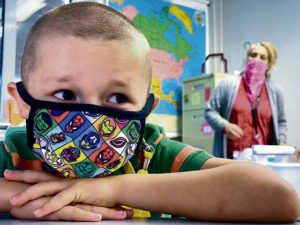
As the winter season approaches and temperatures drop, most of us will begin spending more time indoors around family and friends. As such, healthcare officials warn that now is not the time to become complacent and let down your guard when it comes to COVID.
As much of Europe is in the midst of a second wave of the novel coronavirus, public health experts are concerned about the situation worsening with the start of the flu season. European health officials warn the combination of two highly infectious respiratory outbreaks occurring simultaneously would put an unimaginable strain on the overall healthcare system.
“As everyone knows, cases are on the rise across all of our host nations, and as a result, we are seeing a similar increase in our populations,” said Col. Rodney Coldren, director of Preventive Medicine Services for Public Health Command Europe. “Over the past few months, we have typically seen sporadic COVID cases with occasional super spreading events. However, we are now seeing a slow, but steady, stream of cases in all of our locations across Europe. (Department of Defense Education Activity Europe) schools, military health clinics and dental clinics even had to suspend their normal or routine operations. I do not believe that the second wave is going to get any less severe anytime soon.”
Recent surveys conducted in the U.S. indicate that many people think that just wearing a facemask is protection enough.
According to medical experts, while facemasks can decrease the risk of infection, both for the wearer and as source control, they are not protective enough to have any bearing on being in what is considered a close contact. The bottom line is, being in close contact, or proximity, with someone for an extended period of time presents a threat to all those involved.
So what is considered a close contact and an extended period of time?
“As a general guideline, close contact is defined as being less than six feet apart for more than 15 minutes (cumulative),” Coldren added. “Being outdoors at rest (not exercising) at this distance is likely quite protective. However, being in a poorly-ventilated room for a long time is not particularly protective.”
“Remember, the closer you get, the less time is required,” said Coldren. “You don’t have to engage in a 15 minute hug to be considered a close contact. Likewise, if you are in a meeting in a closed room for an hour, six feet really isn’t sufficient separation between individuals. It’s really a judgement call, but coworkers and individuals in conference or meeting rooms often will be considered close contacts for the purpose of quarantining.”
Health officials warn that most COVID cases are caused by a minority of infected individuals. COVID explodes via super spreader events, or large gatherings of people, and that’s why identifying and quarantining close contacts is so important.
“The danger is that when we quarantine those who are considered ‘close contacts’ and they end up all testing negative, some people might think we over-reacted and that we labeled too many people as close contacts,” said Coldren. “A few studies have shown that most infected people only end up infecting household contacts, yet not infecting any of their other so-called close contacts. The problem is that we have no way of knowing who is a super spreader and who isn’t.”
So what can and should individuals do to protect themselves and those around them this winter?
“As we all try to adjust to life under the ‘new normal’, that doesn’t mean returning to life as we knew it pre-COVID,” Coldren said. “Remember, anything done virtually is the safest and anything done outdoors is better than indoors. However, if you absolutely do need to accomplish something in person or face-to-face, the shorter amount of time and the further apart you are with others the better. And yes, by all means, please wear a mask, but don’t rely on it alone.”
“Of course, the best protection against COVID by far, is to not be too close to someone who has it. We all know how to keep this beast in check, we simply cannot let our guard down,” concluded Coldren.


